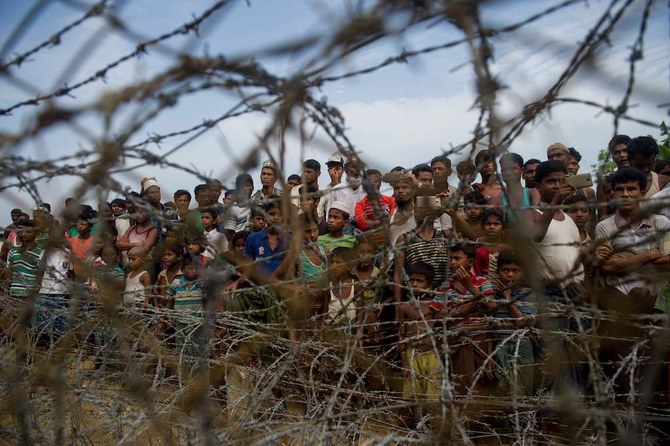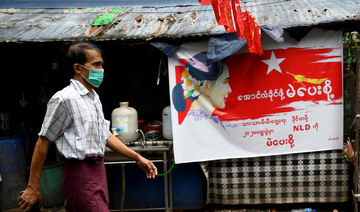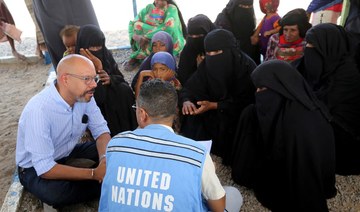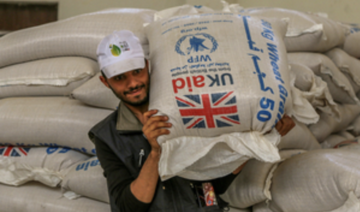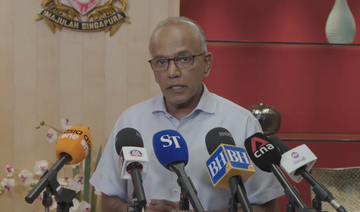DHAKA: Myanmar has excluded more than 1.1 million Rohingya refugees from voting as the country went to the polls for general elections on Sunday.
Many Rohingya, forming the world’s largest refugee settlement in neighboring Bangladeshi city Cox’s Bazar, said they felt “anguished” after being deprived of their rights.
“I have never been able to exercise my voting rights in Myanmar’s elections. I don’t know whether I will be able to do so in my lifetime,” Nurul Amin, 32, a Rohingya community leader from the Kutupalang refugee camp, told Arab News.
“This voting right is very significant for us as, without it, we can’t avail any other citizenship rights. There is no opportunity to run any business and enroll our children in government-run schools and colleges,” the father of three added.
Amin is among a majority of refugees in Cox’s Bazar demanding the restoration of their citizenship rights, including the right to vote in Myanmar’s elections.
Bangladesh is hosting hundreds of thousands of Rohingya who fled from persecution at the hands of the Myanmar military in the Buddhist-majority country.
The Rohingya endured decades of abuse and trauma in Myanmar, beginning in the 1970s, when hundreds of thousands sought refuge in Bangladesh.
Between 1989 and 1991, an additional 250,000 fled when a military crackdown followed a popular uprising and Burma was renamed Myanmar.
In 1992, Bangladesh and Myanmar agreed on a repatriation deal that led to thousands of Rohingya returning to Rakhine State.
The latest Rohingya exodus to Bangladesh resumed in August 2017 following a military crackdown on the ethnic minority group in the country.
Sunday’s elections are Myanmar’s second since the end of a long-time military dictatorship.
Recalling the trauma of past events, 42-year-old Ayub Khan, a Rohingya refugee from Kutupalang camp, said he felt “non-existent” after being excluded from the voting process.
“I have served my community as a chairman for two terms, but I couldn’t vote during the last national election since the government withdrew our citizenship rights. It’s our fundamental right, and we want it back when our repatriation to Myanmar begins,” Khan told Arab News.
“My father voted in the 1978 Myanmar election. How can I be considered an outsider when we have been living there for generations?”
The Myanmar government denies Rohingya citizenship and has labeled them “Bangla intruders.” Authorities even excluded the minority group from the 2014 census.
Temporary identity cards issued to Rohingya were also canceled just before the last general election in 2015, making them ineligible to vote.
“According to Myanmar government data, we don’t have any existence as we were excluded from the latest census. I already spent half of my life with this discrimination, but I want to provide my children with a good education. In the current situation, I can’t make my dream true,” said Rohingya refugee Ayesha Bibi, a 37-year-old mother of three.
Fatema Begum, 47, agreed and expressed her frustration at Myanmar’s latest move.
“Myanmar has an elected government now, but we don’t have any representation in that process. It’s a shame for my country," Begum said.
“We hope the new government will expedite our repatriation process and restore our rights. We are experiencing a miserable life in the refugee camps.”
Experts in Bangladesh said that Rohingya could not take part in the election since their “political rights” have been “ignored by the authorities.”
Humayun Kabir, former Bangladeshi ambassador to the US, told Arab News: “Refugees can take part in their homeland’s election process only if the authorities register them and introduce special mechanisms to cast refugee votes.”
In a statement on Friday, UN Secretary-General Antonio Guterres called for a “peaceful, orderly and credible” election process in Myanmar and expressed hope that it might lead to refugees returning “in safety and dignity.”
However, Human Rights Watch (HRW) expressed doubts about Myanmar’s ability to conduct free and fair elections.
“The election can’t be free and fair so long as a quarter of the seats are reserved for the military, access to state media isn’t equal, government critics face censorship or arrest and Rohingya are denied the vote,” Brad Adams, Asia director of HRW, said in a statement.




